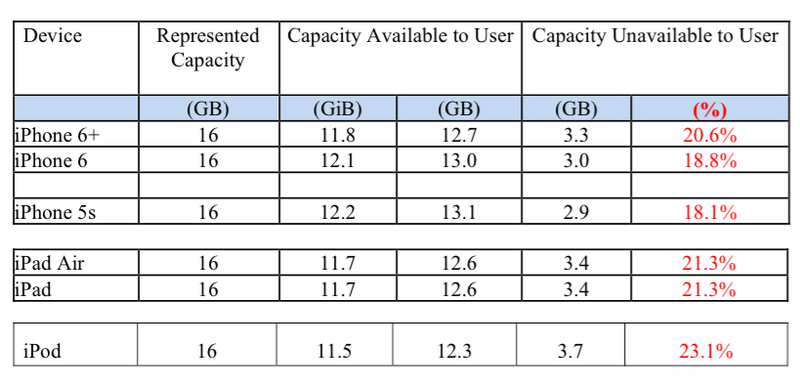Apple accused of overstating memory of mobile devices
Florida plaintiffs are surprised: only 13 GB can be recorded on a 16-GB iPhone

Paul Orshan and Christopher Endara sued Apple. In it, the giant from Cupertino is accused of overstating the real volumes of the permanent storage of their mobile devices. The lawsuit is not collective, although it is trying to obtain this status.
Any user of modern smartphones is familiar with this situation: the volume is advertised in gigabytes or other multiples of ten units of measure. But in the overwhelming majority of cases, the end user can dispose of a much smaller amount of permanent storage - some are “eaten up” by the operating system, some are caused by differences between decimal (kilo, mega, gigabyte) and binary (kibi, mebli, bend) consoles.
It seems that this injustice is taken for granted by almost everyone, but not two people in Miami. They say that on the 16 gigabyte iPhone and iPad they bought, less storage was available than stated. After updating iOS from version 7 to 8, the amount of available memory fell even lower. The plaintiffs note that there is a fair share of irony in what iOS 8 calls the manufacturer - “the largest iOS update in history.”
There are specific figures in the complaint, they are presented in the table above. As you can see, the difference between gigabytes and gibytes is not taken into account, the essence of the claim is only in the place that is needed to store system files. Differences in real space with advertised reaches 23 percent.
This is not limited to: Apple is accused of intentionally underestimating the volume in order to force users to buy a place in the iCloud cloud storage. It is proposed to purchase it after the place runs out on devices. And this can happen very inappropriately when you need to shoot a video or photograph a memorable moment, the lawsuit says. Each of the less received gigabytes is estimated at 400-500 high-resolution photos.
No comments have been received from Apple yet .
This is not the first such lawsuit against Apple. In 2007, the Canadian filed a similar complaint: on the iPod Nano, out of 8 declared gigabytes, only 7.45 was available for use. The difference was only 7.5%. The lawsuit was rejected .
A similar charge was against Microsoft: in the earlier 64GB Surface models, only 23GB of data could be recorded .
Details of the claim .
